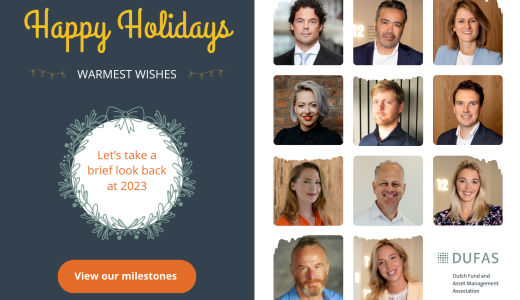Our 2021 milestones

director general
This year has been a challenging one. But still we managed to achieve excellent results for the sector. I am very proud of our team and the output we have delivered. We would like to thank all members who took part in the committees and expert groups and contributed to achieving these results. Have a look at our 2021 milestones.

communications
First DUFAS podcast: 'Why do(n't) people invest?'
Investing is becoming increasingly important to grow assets for the future, but it is still not common for the 'general public'. Why is this so, and what can we do about it? This was the topic of a first series of podcasts (in Dutch) we launched early in 2021, which reached thousands of people in our sector. The series also sparked discussions with various stakeholders, including the Dutch Ministry of Finances and the Dutch Authority for the Financial Markets (Autoriteit Financiële Markten, abbreviated to AFM). The AFM executive board member, Jos Heuvelman, was even a guest in one of our episodes.

regulatory affairs
Considerable added value to sustainability topics
Our Sustainability Committee and Expert Groups exchanged a great deal of knowledge and provided considerable output. According to the survey carried out among our members this year, this was considered to be of tremendous added value. In terms of distribution, we provided active input to the European Commission for the Retail Investment Strategy. Moreover, with our IFR/IFD Expert Group, we did everything in our power to achieve adjustments to the new capital requirements.

sustainability
Support with SFDR implementation
Our SFDR Expert Group convened often this year, and became an active group of 60 participants. This provided support for members in implementing level 1 of the Sustainable Finance Disclosure Regulation (SFDR), although a good deal of clarification is still needed for the SFDR. Together with our members, we developed a list of topics on which we will actively start working in 2022.

communications
More focus in communication
The foundations laid in 2020 relating to our branding and house style were developed further in 2021. We also revamped the annual report to make it suitable for the present time. LinkedIn and our renewed website and email tool have made it possible for us to measure the effectiveness of our communications even more accurately. In turn, this insight has been used to increase our focus, which led to a surge in new LinkedIn followers and a newsletter that is popular with our members.

regulatory affairs
Strong lobbying views
We responded actively to proposed legislation governing the Dutch Wet aanpassing fiscaal kwalificatiebeleid rechtsvormen, with which we achieved a temporary suspension. With the Fiscal Committee, we carried out lobbying activities relating to files that involved FBI/VBI. We also launched an Information Security Expert Group. In addition, we organised an educational session on compliance with Dutch Anti Money Laundring and Terrorist Financing Act [Wet ter voorkoming van witwassen en financieren van terrorisme, abbreviated to Wwft] for asset managers.

public affairs
Awareness of the significance of a strong asset management sector
We expanded our political network. As well as lobby-related meetings, we also organised election debates with other financial associations early this year. We are making progress with several files, such as Box 3 where we lobby for a capital gains tax based on actual returns. By convincing increasingly more politicians and stakeholders of the significance of a strong asset management sector in the Netherlands, we will be able to successfully adjust current and new laws and legislation imposed by the EU or the Dutch government.

events
High-impact events and strengthening relationships
We organised an election debate around the Dutch elections, which was of considerable interest to our members, and which enabled us to strengthen our relations with a number of politicians. By means of several webinars, we also shared information on sustainability topics such as biodiversity, impact measurements, and the 'S' in ESG (Environmental Social and Corporate Governance).
Changes in proposed legislation and timelines

regulatory affairs
At the end of the year we put a major effort into arranging a further adjustment in the Dutch Implementatiewet registratie uiteindelijk belanghebbenden van trusts en soortgelijke juridische constructies, the implementation act that affects registration of ultimate beneficial owners (UBOs) for collective investment funds [fondsen voor gemene rekening]. This adjustment, which will need to be confirmed in Januari 2022, will save asset managers a significant administrative burden. Through our European lobby, we were able to postpone implementation of the PRIIPs KID for UCITS funds. In addition, the review of the Alternative Investment Fund Managers Directive (AIFMD) was started this year. This is a major undertaking, and one that will keep us occupied throughout 2022.

climate change and sustainability
Making ourselves heard at the European level about necessary sustainability data
In 2021, we issued the first progress report relating to the Dutch Climate Commitment. Data are highly significant for sustainable progress, and therefore we focused on responses to European consultations on sustainability data, such as the European Commission’s proposals on the European Single Access Point (ESAP) and the Corporate Sustainability Reporting Directive (CSRD).

office manager
More insight into our financial administration
We transferred our financial and personnel administration to a new party, and processes have been set up even more efficiently. In addition, invoices are now paid every week, and we also have a detailed monthly insight into our figures.


